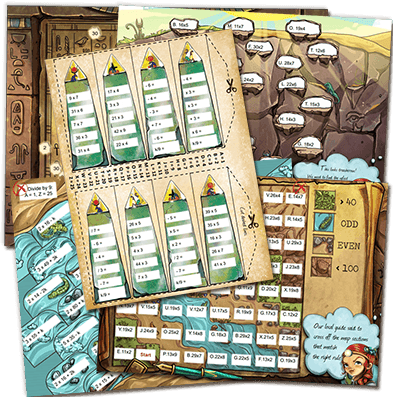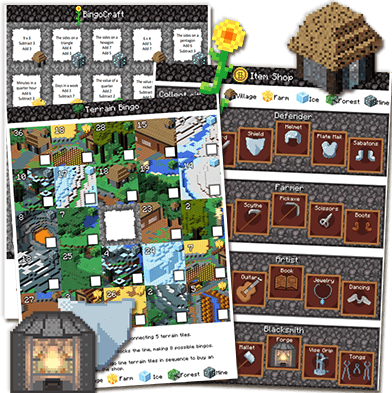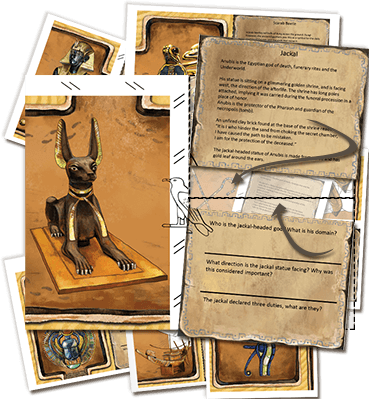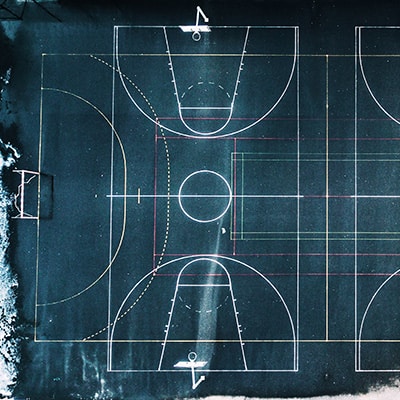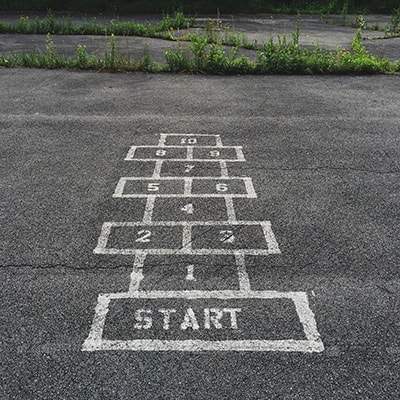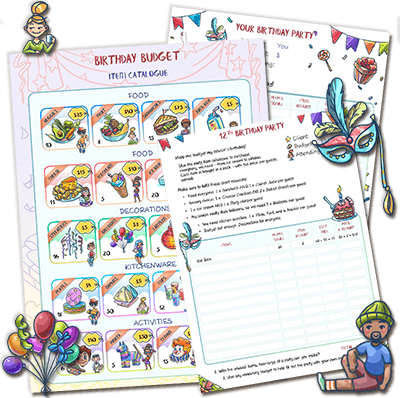The Teaching Tips Blog
Here's our complete collection of tips and teaching resources. Enjoy!

Here's a free tip from us - classroom parties are always an instant win! These kids party themes will help you plan the whole thing.
Ratios (6.RP.A.1 .2 .3 .a .b .c .d) – Printable Worksheets
Ratios – Printable Worksheets Ratios and Proportions – Free printable worksheets covering sixth grade ratio and proportion standards. Understand ratio concepts and use ratio reasoning to solve problems. CCSS.Math.Content.6.RP.A.1 – Understand the concept of a ratio and use ratio language to describe a ratio relationship between two quantities. For example, “The ratio of wings to beaks in the bird house…
More...Measuring Angles – Interactive Protractor (4th Grade)
Measuring Angles – Interactive Protractor (4th grade) Measuring Angles – Interactive protractor where you measure the angle and type in its measurement. It will check your answer immediately. CCSS.Math.Content.4.MD.C.6 – Measure angles in whole-number degrees using a protractor. Sketch angles of specified measure. Choose A Printable Classroom Kit: Million To Mars Maths | Physics Help the SpaceX team land the…
More...Lines & Angles- Rays, Perpendicular, Parallel Lines, and Angles Online Games
Lines & Angles – Online Games Lines Game – Online game where you identifying line segments, rays, and perpendicular and parallel lines. Decide the Angle – You are being attacked by Aliens and you need to set your laser at the correct angle in degrees to hit it. Draw and identify lines and angles, and classify shapes by properties of…
More...Angles – Printable Worksheets (4th and 7th Grade)
Angles: Printable Worksheets (4th – 7th Grade) Angles Worksheets – Angle worksheets cover almost all aspects of angle topics in geometry. It contains naming angles in different ways, identifying parts of the angles, classifying types, measuring angles with protractor, complementary and supplementary angles, angles formed between intersecting lines, simple algebra problems based on angles, angles formed by parallel lines and…
More...Teaching 4.G.A.3 – Recognize and Draw Lines of Symmetry & Identify Line-Symmetric Figures
Recognize and Draw Lines of Symmetry Geometry – 4th Grade Draw and identify lines and angles, and classify shapes by properties of their lines and angles. CCSS.Math.Content.4.G.A.3Recognize a line of symmetry for a two-dimensional figure as a line across the figure such that the figure can be folded along the line into matching parts. Identify line-symmetric figures and draw lines…
More...Teaching 4.G.A.1 .2 – Draw Points, Lines, Line Segments, Rays, Angles (Right, Acute, Obtuse) & Perpendicular & Parallel Lines – Classify Two-Dimensional Figures & Identify Right Triangles
Draw Points, Lines, and Angles Geometry – 4th Grade Draw and identify lines and angles, and classify shapes by properties of their lines and angles. CCSS.Math.Content.4.G.A.1Draw points, lines, line segments, rays, angles (right, acute, obtuse), and perpendicular and parallel lines. Identify these in two-dimensional figures. CCSS.Math.Content.4.G.A.2Classify two-dimensional figures based on the presence or absence of parallel or perpendicular lines, or…
More...4.MD.C.6 .7 – Measure and Sketch Angles in Whole-Number Degrees using a Protractor & Recognize Angle Measure as Additive
Measure and Sketch Angles in Whole Number Degrees Measurement & Data – 4th Grade Geometric measurement: understand concepts of angle and measure angles. CCSS.Math.Content.4.MD.C.6Measure angles in whole-number degrees using a protractor. Sketch angles of specified measure.CCSS.Math.Content.4.MD.C.7Recognize angle measure as additive. When an angle is decomposed into non-overlapping parts, the angle measure of the whole is the sum of the angle…
More...Teaching 4.MD.C.5 .a .b – Understand Angles and Concepts of Angle Measurement
Understanding Angles and Concepts of Angle Measurement Measurement & Data – 4th Grade Geometric measurement: understand concepts of angle and measure angles. CCSS.Math.Content.4.MD.C.5Recognize angles as geometric shapes that are formed wherever two rays share a common endpoint, and understand concepts of angle measurement: CCSS.Math.Content.4.MD.C.5.aAn angle is measured with reference to a circle with its center at the common endpoint of…
More...Teaching 4.MD.B.4 – Make a Line Plot to Display a Data Set of Measurements in Fractions of a Unit (1/2, 1/4, 1/8)
Make A Line Plot to Display a Data Set Measurement & Data – 4th Grade Represent and interpret data. CCSS.Math.Content.4.MD.B.4Make a line plot to display a data set of measurements in fractions of a unit (1/2, 1/4, 1/8). Solve problems involving addition and subtraction of fractions by using information presented in line plots. For example, from a line plot find…
More...Teaching 4.MD.A.3 – Apply Area and Perimeter Formulas for Rectangles in Real World and Mathematical Problems
Applying Area and Perimeter Formulas for Rectangles in the Real World Measurement & Data – 4th Grade Solve problems involving measurement and conversion of measurements. CCSS.Math.Content.4.MD.A.3Apply the area and perimeter formulas for rectangles in real world and mathematical problems. For example, find the width of a rectangular room given the area of the flooring and the length, by viewing the…
More...Teaching 4.MD.A.2 – Use the Four Operations to Solve Problems Involving Measurement and Conversion
Using the Four Operations to Solve Problems Involving Measurement and Conversion Measurement & Data – 4th Grade Solve problems involving measurement and conversion of measurements. CCSS.Math.Content.4.MD.A.2Use the four operations to solve word problems involving distances, intervals of time, liquid volumes, masses of objects, and money, including problems involving simple fractions or decimals, and problems that require expressing measurements given in…
More...Teaching 4.MD.A.1 – Know Relative Sizes of Measurement Units Including km, m, cm; kg, g; lb, oz.; l, ml; hr, min, sec.
Measurement & Data – 4th Grade Solve problems involving measurement and conversion of measurements. CCSS.Math.Content.4.MD.A.1Know relative sizes of measurement units within one system of units including km, m, cm; kg, g; lb, oz.; l, ml; hr, min, sec. Within a single system of measurement, express measurements in a larger unit in terms of a smaller unit. Record measurement equivalents in…
More...Teaching 4.NF.C.7 – Compare Two Decimals to Hundredths by Reasoning about their Size
Compare Two Decimals to Hundredths Number & Operations – Fractions – 4th Grade Understand decimal notation for fractions, and compare decimal fractions. CCSS.Math.Content.4.NF.C.7Compare two decimals to hundredths by reasoning about their size. Recognize that comparisons are valid only when the two decimals refer to the same whole. Record the results of comparisons with the symbols >, =, or <, and…
More...Teaching 4.NF.C.5 .6 – Express a Fraction with Denominator 10 as an Equivalent Fraction with Denominator 100 & Decimal Notation with Denominators 10 or 100
Expressing Fractions Number & Operations – Fractions – 4th Grade Understand decimal notation for fractions, and compare decimal fractions. CCSS.Math.Content.4.NF.C.5Express a fraction with denominator 10 as an equivalent fraction with denominator 100, and use this technique to add two fractions with respective denominators 10 and 100.2 For example, express 3/10 as 30/100, and add 3/10 + 4/100 = 34/100. CCSS.Math.Content.4.NF.C.6Use…
More...Teaching 4.NF.B.3.d – Solve Word Problems Involving Addition and Subtraction of Fractions
Number & Operations – Fractions – 4th Grade Build fractions from unit fractions. CCSS.Math.Content.4.NF.B.3.d Solve word problems involving addition and subtraction of fractions referring to the same whole and having like denominators, e.g., by using visual fraction models and equations to represent the problem. Teacher Notes Teaching students the strategies to solve word problems is aided by the use of…
More...Teaching 4.NF.B.3.c – Add and Subtract Mixed Numbers with Like Denominators
Number & Operations – Fractions – 4th Grade Build fractions from unit fractions. CCSS.Math.Content.4.NF.B.3.cAdd and subtract mixed numbers with like denominators, e.g., by replacing each mixed number with an equivalent fraction, and/or by using properties of operations and the relationship between addition and subtraction. Teacher NotesKnowing how do you decompose an improper fraction into a sum of a whole number…
More...Teaching 4.NF.B.3 .a.b – Decomposing Fractions – Adding & Subtracting Fractions
Number & Operations – Fractions – 4th Grade Build fractions from unit fractions. CCSS.Math.Content.4.NF.B.3Understand a fraction a/b with a > 1 as a sum of fractions 1/b. CCSS.Math.Content.4.NF.B.3.aUnderstand addition and subtraction of fractions as joining and separating parts referring to the same whole. CCSS.Math.Content.4.NF.B.3.bDecompose a fraction into a sum of fractions with the same denominator in more than one way,…
More...Teaching 4.NF.A.2 – Compare Two Fractions with Different Numerators and Different Denominators
Number & Operations – Fractions – 4th Grade Extend understanding of fraction equivalence and ordering. CCSS.Math.Content.4.NF.A.2Compare two fractions with different numerators and different denominators, e.g., by creating common denominators or numerators, or by comparing to a benchmark fraction such as 1/2. Recognize that comparisons are valid only when the two fractions refer to the same whole. Record the results of…
More...Teaching 4.NF.A.1- Equivalent Fractions using Visual Fraction Models
Number & Operations – Fractions – 4th Grade Extend understanding of fraction equivalence and ordering. CCSS.Math.Content.4.NF.A.1Explain why a fraction a/b is equivalent to a fraction (n × a)/(n × b) by using visual fraction models, with attention to how the number and size of the parts differ even though the two fractions themselves are the same size. Use this principle…
More...Teaching 4.NBT.B.6 – Find Whole-Number Quotients & Remainders with up to Four-Digit Dividends & One-Digit Divisors
Number & Operations in Base Ten – 4th Grade Use place value understanding and properties of operations to perform multi-digit arithmetic. CCSS.Math.Content.4.NBT.B.6 Find whole-number quotients and remainders with up to four-digit dividends and one-digit divisors, using strategies based on place value, the properties of operations, and/or the relationship between multiplication and division. Illustrate and explain the calculation by using equations,…
More...Teaching 4.NBT.B.5 – Multiply a Whole Number of up to Four Digits by a One-Digit Number & Multiply Two Two-Digit Numbers
Number & Operations in Base Ten – 4th Grade Use place value understanding and properties of operations to perform multi-digit arithmetic. CCSS.Math.Content.4.NBT.B.5 Multiply a whole number of up to four digits by a one-digit whole number, and multiply two two-digit numbers, using strategies based on place value and the properties of operations. Illustrate and explain the calculation by using equations,…
More...Teaching 4.NBT.B.4 – Fluently Add and Subtract Multi-Digit Whole Numbers Using the Standard Algorithm
Number & Operations in Base Ten – 4th Grade Use place value understanding and properties of operations to perform multi-digit arithmetic. CCSS.Math.Content.4.NBT.B.4 Fluently add and subtract multi-digit whole numbers using the standard algorithm Teacher Notes The teacher needs to continue talk about and use place value in describing and justifying the processes students use to add and subtract. Reenforcing place…
More...Teaching 4.NBT.A.3 – Use Place Value to Round Multi-Digit Whole Numbers
Number & Operations in Base Ten – 4th Grade Generalize place value understanding for multi-digit whole numbers. CCSS.Math.Content.4.NBT.A.3 Use place value understanding to round multi-digit whole numbers to any place. Teacher Notes The teacher needs to understand the role place value has in understanding whole numbers. Understanding place value and the base ten number system helps students apply the same…
More...Teaching 4.NBT.A.2 – Read & Write Multi-Digit Whole Numbers Using Numerals, Number Names & Expanded Form & Compare Two Multi-Digit Numbers
Number & Operations in Base Ten – 4th Grade Generalize place value understanding for multi-digit whole numbers. CCSS.Math.Content.4.NBT.A.2 Read and write multi-digit whole numbers using base-ten numerals, number names, and expanded form. Compare two multi-digit numbers based on meanings of the digits in each place, using >, =, and < symbols to record the results of comparisons. Teacher Notes The…
More...